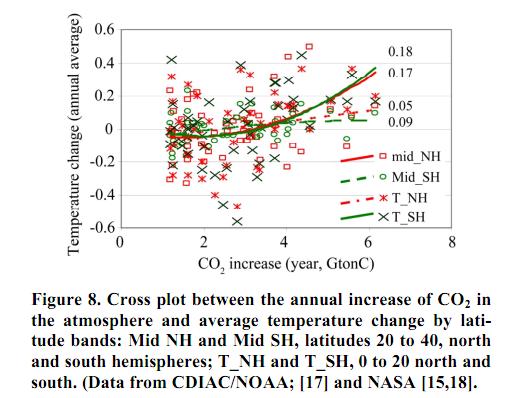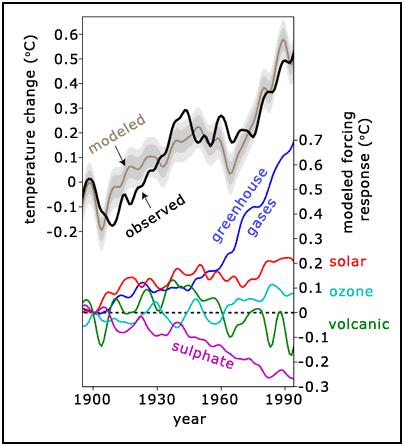Not a cite for Soare eyes
Posted on 16 January 2011 by MarkR
A recent paper in an obscure journal (Soares, 2010) used correlations between temperatures and CO2 concentrations to conclude that;
"The absence of immediate relation between CO2 and temperature is evidence that rising its mix ratio in the atmosphere will not imply more absorption and time residence of energy over the Earth surface. This is explained because band absorption is nearly all done with historic CO2 values."
Soares looks at correlations between change in CO2 and change in temperature for a month to a few years. He doesn't find a correlation between short term CO2 changes and temperature changes in the following months. His Figure 8 shows the change in temperature or CO2 from one year to the next.

Do we live in Soares’ world where CO2 isn’t causing warming, or in the world of mainstream physics where theory and measurements show increased CO2 heating? What does mainstream physics expect to see in the above graph?
Firstly it expects atmospheric temperatures to change regularly: natural cycles like El Nino transfer heat from the oceans and can change atmospheric temperature by up to 0.4 °C in a year causing the big vertical spread.
The graph below is based on Meehl et al, 2004 and shows a climate model estimate of how much global warming was expected from greenhouse gases for the past century: always less than 0.02 °C/year - so small that the noise effectively hides the incline if you only look at year to year changes. Fortunately, very simple statistical techniques work around this.
Some rough calculations using the NASA global data shows that to detect the expected CO2 global warming for the past 40 years at 95% confidence would require about 160 years of measurements - and hundreds more measurements to detect the CO2 signal when it is smaller.

The next trick is to implicitly assume that nothing else shows a warming or cooling pattern: but we know that there is. From the 1940s to the 1970s we pumped enough reflective aerosols into the atmosphere to temporarily halt global warming by 'global dimming' (Ramanathan et al, 2001).
This is like putting a pan of water over a lit gas stove and then dropping in an icepack big enough to cool the water. Soares would say the cooling shows that burning gas can’t heat water, but mainstream science says that a big pack of ice temporarily masks the heating and that burning gas does, in fact, make water warmer than it would otherwise be. Importantly, you can account for the ice and determine whether the heat is on and other scientists would do this.
Soares’ method is like searching for a needle in a huge haystack by picking a handful of hay rather than using a magnet. You almost certainly wouldn’t find the needle even if it was there, so to claim you’ve disproved its existence when other scientists have found it with their magnets is simply stunning.
UPDATE: This blog post has been used as a rebuttal to the skeptic argument 'Soares finds a lack of correlation between CO2 and temperature'.































 Arguments
Arguments































They just asked me to review a paper about the Earth's magnetism. That is about all I got from the abstract; hardly understood anything. Almost looks as if they send the manuscripts to random scientists.